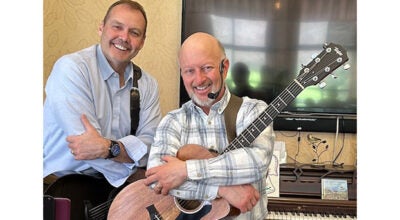Dowagiac native explains work in Dominican Republic
Published 11:02 am Friday, December 18, 2015

Dowagiac native Sarah Ross explains the operation of her Dominican Republic school, 3 Mariposas Montessori, to members of Dowagiac Rotary during their meeting Thursday at the Elks Lodge. (Leader photo/TED YOAKUM)
Even in a country as deeply divided by race as the Dominican Republic, early childhood education can serve as a unifying force.
Since Dowagiac native Sarah Ross established her nonprofit Montessori school, 3 Mariposas, in the Caribbean nation six years ago, she has set out to do her part to bring children of Dominican and Haitian descents, along with those from nationalities found outside the island country, together inside one establishment.
“I thought it was important to start young, at age 1, and get to know the people you’re living next to and their culture, and to be sensitive to it,” Ross said.
Today, her school serves as an example of how to bridge the gap between segregated groups of people, with students who would have otherwise never interacted with each other learning, playing and socializing in harmony, Ross said.
The educator and Dowagiac Union High School graduate shared this and other experiences she has had working with children overseas with members of the Dowagiac Rotary Club Thursday afternoon. Ross was invited to speak to the service organization during its weekly meeting at the Elks Lodge by Rotarian Charlie Gratz, an old family friend of Ross.’
For the Dowagiac native, living and working overseas fulfills two passions she has had since childhood, traveling and learning new languages. During her senior year of college, Ross decided to travel to the Dominican Republic to learn Spanish— an experience she initially hated, due to her inability to communicate with anyone living there.
Despite that, she would later return the country, intending to teach children living there for only a year or so before returning back the U.S. — a plan that changed greatly after her arrival.
“It’s been about 15 years that I lived in the country now, and I’ve obviously fallen in love with it,” Ross said.
After working with a major nonprofit for several years, Ross eventually decided to open 3 Mariposas Montessori in the village of Cabarete, located just minutes from the northern coast of the island. The name, which translates to “three butterflies,” refers to the function of the school: not only does her staff of 12 provide English lessons and other educational lessons to children, but to teachers and parents as well.
“I’m a firm believer that education doesn’t stop at school,” Ross said. “It needs to continue in the home and in the environment in which they [students] live.”
Starting off with an inaugural class of just 11, the school currently has 51 students enrolled in classes, 70 percent of which attend with a full-ride scholarship, Ross said. Nearly three-quarters of the students attending the school live in the Dominican Republic, with an equal amount of Dominican and Haitian children enrolled, Ross said.
Unlike the traditional, instruction-driven classrooms that dominate public and private schools in the Dominican Republic, the Montessori school allows children to learn at their own pace, with hands-on activities that allows kids to socialize while building their academics.
“One of the first things we want the children to develop is their independence,” Ross said.






